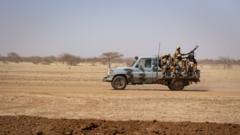Reports from three Ghanaian men shed light on their participation in the ongoing conflict in Burkina Faso, driven by personal grievances, financial incentives, and communal ties amidst widespread violence and displacement caused by the insurgency.
Ghanaians Join the Fight in Insurgency-Ravaged Burkina Faso

Ghanaians Join the Fight in Insurgency-Ravaged Burkina Faso
An alarming narrative unfolds as some Ghanaians engage in violent battles against jihadist groups in Burkina Faso, revealing deep-rooted ties and motivations.
In a striking and troubling revelation, three Ghanaians have shared their firsthand experiences of participating in violent clashes against Islamist insurgents in Burkina Faso. The conflict, characterized by gruesome violence and high casualty rates, has pulled individuals from across national borders, as these men described harrowing sights of death and destruction they have witnessed since their involvement began in 2018.
The trio, now in their late thirties or early forties, recounted crossing the long and porous border between Ghana and Burkina Faso undetected by security forces. While they insist that their motivations are not chiefly religious in nature, personal tragedies and ethnic alliances have heavily influenced their decision to fight. One of the men revealed the tragic fate of his entire family, murdered by the Burkinabe army during a military operation, prompting him to seek revenge.
Though the men diverged in their views on whether they have participated in civilian attacks, they did acknowledge that the rapid escalation of violence has affected their psyche. One man stated, "It’s very bad. But this fight has entered our blood," conveying a sense of resignation to the ongoing violence.
Despite the serious claims made by these men, the BBC was unable to independently verify their accounts. Nevertheless, they shared detailed accounts of battles, names of jihadist leaders, and evidence of their armed involvement, suggesting a covert recruitment of fighters from Ghana to support anarchic forces across the region.
A 2022 report by an NGO indicated that 200 to 300 young Ghanaians might have been recruited into jihadist movements, a notion contested in a more recent report. The men countered that fighters hail from various Ghanaian ethnicities, highlighting some who are driven by religious belief, while others pursue financial profit from the cattle taken from attacked communities.
Journalists reported that these insurgents are feasting on valuable livestock that they raid from villages, which they later sell in northern Ghana, thus sustaining a cycle of violence and profit. The ongoing insurgency has displaced over two million people in Burkina Faso over the past decade, resulting in unimaginable suffering.
One refugee recounted the horror of witnessing her husband's murder during a raid, emphasizing that the violence is widespread and indiscriminate, extending even to the elderly. Despite Ghana largely escaping the insurgency’s grip, recent disturbances in northern regions have ignited fears that jihadism may gain a foothold within Ghana's borders.
Local governmental responses have been minimal, with some calculating how weapons smuggling from Burkina Faso via clandestine routes exacerbates already volatile situations like the ethnic clashes in Bawku. As residents and officials alike express concern, the fear of potential jihadist infiltration looms large.
Amidst the cacophony of conflict, these men poignantly acknowledged the unpredictable nature of such insurgencies, recognizing the possibilities of violence spreading beyond Burkina Faso if left unchecked. The men’s contrasting feelings about the state of jihadist warfare emphasize the complexities and contradictions of motivations underlying their fight—one man rejecting the label of jihad to describe the brutal reality of theft and murder prevalent in the region.
As the situation develops, it represents not only a personal tragedy for those gravitating towards violence but also poses a broader threat of destabilization that risks engulfing neighboring nations in the West African Sahel.
The trio, now in their late thirties or early forties, recounted crossing the long and porous border between Ghana and Burkina Faso undetected by security forces. While they insist that their motivations are not chiefly religious in nature, personal tragedies and ethnic alliances have heavily influenced their decision to fight. One of the men revealed the tragic fate of his entire family, murdered by the Burkinabe army during a military operation, prompting him to seek revenge.
Though the men diverged in their views on whether they have participated in civilian attacks, they did acknowledge that the rapid escalation of violence has affected their psyche. One man stated, "It’s very bad. But this fight has entered our blood," conveying a sense of resignation to the ongoing violence.
Despite the serious claims made by these men, the BBC was unable to independently verify their accounts. Nevertheless, they shared detailed accounts of battles, names of jihadist leaders, and evidence of their armed involvement, suggesting a covert recruitment of fighters from Ghana to support anarchic forces across the region.
A 2022 report by an NGO indicated that 200 to 300 young Ghanaians might have been recruited into jihadist movements, a notion contested in a more recent report. The men countered that fighters hail from various Ghanaian ethnicities, highlighting some who are driven by religious belief, while others pursue financial profit from the cattle taken from attacked communities.
Journalists reported that these insurgents are feasting on valuable livestock that they raid from villages, which they later sell in northern Ghana, thus sustaining a cycle of violence and profit. The ongoing insurgency has displaced over two million people in Burkina Faso over the past decade, resulting in unimaginable suffering.
One refugee recounted the horror of witnessing her husband's murder during a raid, emphasizing that the violence is widespread and indiscriminate, extending even to the elderly. Despite Ghana largely escaping the insurgency’s grip, recent disturbances in northern regions have ignited fears that jihadism may gain a foothold within Ghana's borders.
Local governmental responses have been minimal, with some calculating how weapons smuggling from Burkina Faso via clandestine routes exacerbates already volatile situations like the ethnic clashes in Bawku. As residents and officials alike express concern, the fear of potential jihadist infiltration looms large.
Amidst the cacophony of conflict, these men poignantly acknowledged the unpredictable nature of such insurgencies, recognizing the possibilities of violence spreading beyond Burkina Faso if left unchecked. The men’s contrasting feelings about the state of jihadist warfare emphasize the complexities and contradictions of motivations underlying their fight—one man rejecting the label of jihad to describe the brutal reality of theft and murder prevalent in the region.
As the situation develops, it represents not only a personal tragedy for those gravitating towards violence but also poses a broader threat of destabilization that risks engulfing neighboring nations in the West African Sahel.





















